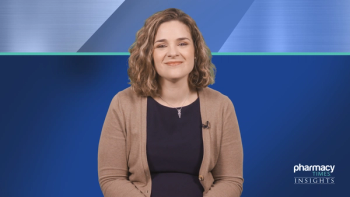Pharmacist Impact in CML: Advancing Access and Frontline Treatment Decisions

An expert discusses how National Comprehensive Cancer Network (NCCN) guidelines recommend first-line chronic myeloid leukemia (CML) treatments, including imatinib, nilotinib, and newer agents, emphasizing the importance of close monitoring through weekly laboratory tests and quantitative polymerase chain reaction testing to track BCR::ABL1 transcript levels and ensure patients meet critical milestones at 3, 6, and 12 months.

An expert discusses how different tyrosine kinase inhibitor (TKI) mechanisms of action, including asciminib’s allosteric binding vs traditional ATP-competitive inhibitors, influence treatment selection based on off-target effects and adverse effect profiles, with patients with advanced-phase chronic myeloid leukemia (CML) requiring second-generation or higher TKIs for faster response rates.

An expert discusses how landmark trials such as ASC4FIRST, ENESTnd, and BFORE provide evidence for frontline tyrosine kinase inhibitor (TKI) selection, with asciminib showing superior tolerability and lower discontinuation rates (4.5%) compared with first-generation (11%) and second-generation TKIs (9.8%).

An expert discusses how achieving molecular and clinical milestones early in chronic myeloid leukemia (CML) treatment reduces transformation risk, enables potential treatment discontinuation after specific criteria are met, and helps identify treatment resistance requiring mutational analysis or adherence assessment.

An expert discusses how traditionally later-line therapies such as ponatinib and asciminib are now being reconsidered for earlier use, with asciminib approved for frontline treatment and ponatinib potentially used as second-line therapy for patients with specific mutations or comorbidities.

An expert discusses how pharmacists play a crucial role in managing tyrosine kinase inhibitor toxicities through proactive monitoring strategies, patient education about adverse effects such as myelosuppression and fluid retention, and early intervention protocols to maintain treatment adherence and quality of life.

An expert discusses how pharmacists can expand their role in chronic myeloid leukemia (CML) care through remote medication therapy management, adherence support, and helping patients navigate insurance barriers and medication access challenges to ensure successful long-term treatment outcomes.

A panelist discusses how accessing tyrosine kinase inhibitors for chronic myeloid leukemia treatment faces multiple barriers including financial challenges from insurance coverage and rising drug costs, prior authorization requirements, social barriers like transportation and health literacy issues, and practical obstacles such as the need to manually request refills for specialty oncology medications.

A panelist discusses how financial burdens and insurance limitations impact chronic myeloid leukemia treatment decisions, with newer drugs like asciminib facing approval challenges despite recent FDA approval, while pharmacists can help overcome these obstacles by educating patients about assistance programs, advocating for access, and helping navigate the complex health care system to ensure sustainable long-term therapy options.

A panelist discusses how social determinants of health including low health literacy, economic instability, housing and transportation issues create significant barriers to tyrosine kinase inhibitor adherence and patient engagement in underserved chronic myeloid leukemia populations, leading to higher cancer-related mortality rates, while pharmacists can help bridge these gaps through tailored education, advocacy for assistance programs, and innovative care delivery methods like virtual visits.

A panelist discusses how pharmacists play a critical role in tyrosine kinase inhibitors treatment evaluation by addressing patient concerns about dosing, administration, and drug interactions while helping assess efficacy, safety, and tolerability through their knowledge of treatment guidelines, individual drug profiles, and adverse effect management strategies to optimize therapy selection and monitoring for each patient's specific circumstances and comorbidities.

A panelist discusses how pharmacists can significantly improve treatment adherence in chronic myeloid leukemia patients through regular patient touchpoints, adherence monitoring, and personalized strategies that address individual barriers, while emphasizing the importance of incorporating patient preferences and goals into tyrosine kinase inhibitor selection through shared decision-making to optimize long-term therapy success.

A panelist discusses how emerging chronic myeloid leukemia treatment advancements, including the addition of asciminib as a frontline tyrosine kinase inhibitor (TKI) option and ongoing research into dual TKI therapy and optimal dosing strategies, are expanding therapeutic choices while pharmacists play a key role in educating patients and providers about evolving treatment algorithms, evaluating new literature, and helping teams manage newer agents with less clinical experience.


